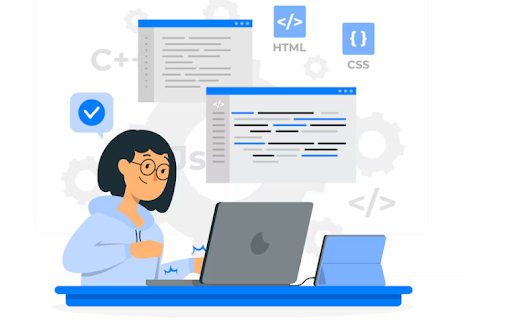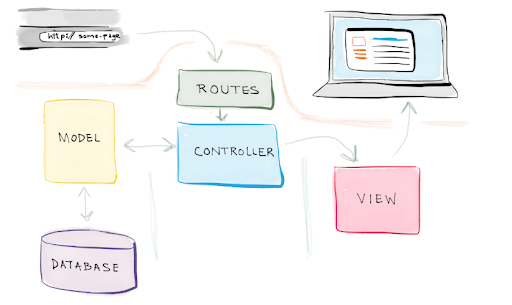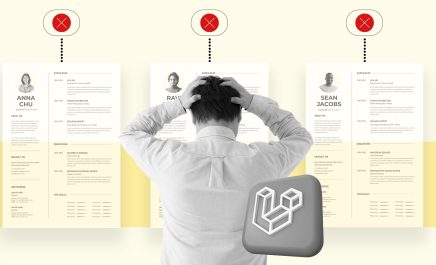Why SaaS Companies Are Still Hiring Laravel Developers in 2025
- Chetan Chaand
- March 23, 2025
- 6 Minute Read

Laravel will remain a pillar in SaaS development in 2025 and be preferred for its strong features, scalability, and flexibility. It has long been a top PHP framework, respected for its elegant syntax and mighty toolkit.
The release of Laravel 12 early in 2025 has also solidified its position in the market, as it comes with new features to improve performance. SaaS companies opt for Laravel due to its expressive syntax, integrated tools, modular structure, and robust security framework, making it the best choice for scalable web applications.
SaaS businesses continue to hire Laravel developers because of their enhanced Laravel developer skill set, mass adoption, thriving community of developers, low hiring costs, and smooth integration with new technologies. Here is a guide on why Laravel remains the master of SaaS!
The Growing Demand for Laravel in SaaS Development

Laravel is now a core part of web application development today. Its vast ecosystem and developer-friendly aspects make it a favorite among businesses.
Its popularity cuts across various industries, with Full Stack Developers constituting the biggest percentage of its user base. What makes Laravel stand out is its active developer community.
With ongoing contributions, new packages, and comprehensive learning materials, developers have everything they need to develop, debug, and improve their applications.
Why SaaS Companies Continue to Choose Laravel in 2025
SaaS companies are still hiring Laravel developers in 2025 for these reasons:
1. Fast Development and Quicker Time-to-Market
Instead of building core functionality from scratch, modern Laravel developers use its modular architecture to streamline workflows. This gets products to market faster. Here are some key features:
- Laravel has built-in features like authentication, routing, and session management.
- Its Model-View-Controller framework maintains an organized codebase, making it easy to scale applications when they grow.
- Laravel’s ecosystem includes tools such as Forge for server management, Vapor for serverless deployment, and Nova for admin dashboards. These contribute to efficiency by automating repetitive tasks.
2. Cost-effectiveness and Open-Source Benefits
Laravel is open-source, so companies do not need to incur licensing fees. Its extensive library of pre-configured modules also reduces the required custom coding. This saves companies lots of money.
Its extensive community of developers adds new plugins, updates, and best practices, allowing companies to experiment without spending high development fees. Laravel’s scalability also saves money on operational costs over the long term.
3. Enterprise-Grade Security
Security is crucial for SaaS applications, and Laravel delivers good protection. Here are some features:
- It has authentication mechanisms built-in for approved users.
- Laravel also secures applications from common vulnerabilities like SQL injection, XSS or Cross-Site Scripting, and CSRF or Cross-Site Request Forgery.
- Its secure API integrations and encrypted communication channels are best for sensitive data.
4. High-Performance SaaS Applications
Laravel has performance-enhancer features such as caching backends, which increase data retrieval speed and reduce loading times:
- The query builder and Eloquent ORM of the framework guarantee maximum database operations.
- Its queue system runs tasks such as sending email notifications and data processing in the background.
- It allows applications to run smoothly even with a large workload.
5. API-First Development and Microservices Compatibility
Laravel is API-first development-friendly, making it easy to develop modular and flexible applications that integrate with external platforms and services.
SaaS businesses employ Microservices architectures, and Laravel allows different components of an application to operate independently.
6. Seamless Third-Party Integrations
Integrating Laravel with external services is quite simple. Be it a payment gateway like Stripe or PayPal, cloud computing like AWS, Google Cloud, or Azure, or business applications like CRM and ERP systems, Laravel has an extendable and effortless integration process.
This aspect is why SaaS enterprises are still hiring Laravel developers in 2025.
7. Stability and Future-Proofing
Laravel keeps evolving with new releases and is current in a fast-paced technology environment. Businesses use Laravel for long-term applications because it offers:
- Periodic security patches and updates
- Backward compatibility, i.e., updates don’t ruin existing applications
- A robust roadmap backed by an active community of developers
The Job Market for Laravel Developers in 2025 – Cost to Hire Laravel Developer

With the ongoing supremacy of Laravel in SaaS development, firms aggressively hire Laravel developers who are capable of developing and refining Laravel applications.
Cost To Hire Laravel Developer and Job Trends
As of February 2025, the average salary for a Laravel developer is $102,005 a year, approximately $49.04 an hour, $1,961/week, or $8,500/month.
The cost to hire Laravel developers depends on the Laravel developer’s skill sets, experience, geography, and the complexity of the projects.
Laravel Developer Skill Set in Demand
Companies hire Laravel developers who have proficiency, specifically in areas like:
- PHP & Laravel framework
- MVC architecture
- Front-end development (HTML, CSS, JavaScript, Vue.js, React)
- Database management (MySQL, PostgreSQL)
- RESTful API development
- Version control (Git, GitHub, GitLab)
- Security best practices
- Cloud deployments (AWS, Google Cloud, Azure)
SaaS firms also highly value problem-solving skills, good communication, and a willingness to learn.
Challenges and Limitations of Laravel for SaaS
Though a general-purpose framework, Laravel will not suit all projects:
- High-performance real-time applications such as chat software or live streams can utilize Node.js, whose event-driven, non-blocking structure fits such demands perfectly.
- People accustomed to alternative languages might enjoy using Django (Python) or Ruby on Rails, depending on their project’s needs.
Laravel supports scaling well but only when well-optimized. Some major concerns are slow-performing queries, poor caching strategies, and excessive middleware that impacts request handling.
However, implementing caching tools decreases server burden and enhances application speed. Compared to Node.js, Django, and Ruby on Rails, all the frameworks are used in particular projects depending on project requirements. Here is a glimpse:
Parameter | Laravel (PHP) | Node.js (JavaScript) | Django (Python) | Ruby on Rails (Ruby) |
Best For | Web applications, SaaS platforms | Real-time applications, APIs | Enterprise applications, AI/ML integration | Rapid MVP development, startups |
Ease of Learning | Easy for PHP developers | Moderate learning curve | Easy due to Python’s simplicity | Moderate learning curve |
Security Features | Strong built-in security | Requires additional security | Strong security | Good security but requires updates |
Community Support | Large and active community | Massive community support | Well-documented, strong community | Supportive developer ecosystem |
Popular Use Cases | E-commerce, SaaS, CMS, CRM | Streaming apps, IoT, APIs, chat apps | AI/ML apps, fintech, healthcare apps | Marketplaces, social networks, MVPs |
Conclusion
Laravel remains a solid force and a powerful framework for SaaS development in 2025. Its clean syntax and rich feature set make development easier and generate high-quality web applications faster.
A massive pool of programmers supports this open-source framework, and Laravel developers benefit from constant upgrades, additional features, and best practices from the industry.
Laravel is helping shape the future of SaaS applications, and businesses are continuously hiring Laravel developers with extensive skill sets to future-proof their software and remain at the top of a competitive online world.
Frequently Asked Questions
Is Laravel still a viable option for SaaS development in 2025?
Ans: Laravel is still a strong contender for SaaS applications because of its compact syntax, inherent functionality, and ever-expanding user base. It helps build sophisticated applications and scalable, high-performance solutions effectively.
Why is Laravel appropriate for scalable SaaS applications?
Ans: Laravel is built to scale as its MVC architecture facilitates a clean and organized codebase. Its Eloquent ORM for database manipulation, the Blade templating system for dynamic user interface generation, and caching modules within the platform enable SaaS businesses to establish highly efficient solutions.
How does Laravel differ from other SaaS frameworks?
Ans: Laravel remains a premium PHP framework because of its developer-friendly features and enterprise-level features. Laravel is more straightforward in development and is a more evolved solution with highly advanced tools.
What are the most demanded Laravel developer skill sets in 2025?
Ans: A perfect Laravel developer would know PHP & Laravel framework basics, MVC patterns, Front-end technologies, Database management, RESTful API building, Version control systems, and Cloud computing.
How is Laravel used with cloud platforms such as AWS and Google Cloud?
Ans: Laravel enjoys integration with cloud platforms, and it supports services such as AWS EC2, Google Cloud Compute Engine, and Azure, making it easy for businesses to deploy their SaaS applications. Laravel’s serverless platform for deployment, Vapor, also makes cloud scaling easy without the need to interact with traditional infrastructure.
What are the common problems of using Laravel in SaaS?
Ans: Too much middleware or unoptimized queries can be a disadvantage. For extremely customized SaaS sites, Laravel functionality may need to be customized, which means deploying expert-level Laravel development to achieve the best possible results.

Thank you for submitting the details!
We will keep your information safe. Feel free to contact us with any questions at hello@uplers.com
Please check your email for next steps shared by Robert.
















